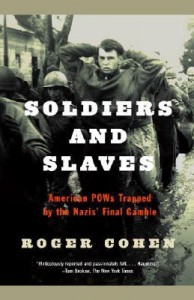 When people think about the Nazi Holocaust, they usually think of a miserable event in world history that resulted in the torturing and deaths of millions of European Jews. What many may not associate with this disastrous event is that American soldiers, mainly of Jewish heritage were also captured, tortured and killed in the holocaust, resulting in a government cover up that left American victims with no way of talking about the dastardly deeds committed upon them, until now.
When people think about the Nazi Holocaust, they usually think of a miserable event in world history that resulted in the torturing and deaths of millions of European Jews. What many may not associate with this disastrous event is that American soldiers, mainly of Jewish heritage were also captured, tortured and killed in the holocaust, resulting in a government cover up that left American victims with no way of talking about the dastardly deeds committed upon them, until now.
In Robert Cohen’s new novel, “Soldiers and Slaves†Cohen uses testimony from individuals who survived this horrible event and recreates the decrepit conditions suffered by our own citizens in German concentration camps. History buffs will be astounded by the sheer amount of depth in the accounts Cohen has taken and how well Cohen has incorporated them within this shocking account of forgotten history.
The story of ”Soldiers and Slaves,” revolves around two 79-year-old men, Jewish-American WWII veteran Howard Shapiro and Hungarian-Jew Mordecai Hauer. Both were victims of German’s cruelty against the Jewish faith and the world, and offer two different and emotional viewpoints. “There were fights, arguments over food; we were screaming at one another, reduced to animals.  The Nazi’s made us slaves. You had no pride, couldn’t even feel for another person,†Shapiro says during one passage. The amount of in-depth information Cohen gets out of Shapiro and Hauer is not only heartfelt, but puts a different shade of gray on this disaster, as after so many years readers can see the holocaust from a point of view never known to exist.
Aside from these two victims being from different parts of the world, Cohen spends a lot of time incorporating the struggles of both victims’ lives after the holocaust into the novel. For example, Shapiro is still having nightmares 40 years after the holocaust, despite becoming a doctor and living alongside a golf course at a retirement community in Florida. Hauer is a retired teacher who lives in the Bronx, who unlike Shapiro, handled the treatment of his time at the concentration camp much better, but had a huge problem to deal with as well; coming to grips about his mother’s death at the concentration camp. Cohen does a phenomenal job in creating a huge level of sympathy for Hauer by letting the reader know what he has gone through.
Hauer’s mother, Camilla was brought to the gas chamber upon her arrival at the concentration camp, and because of this left nothing for her family to remember her by. Despite all the terrible beatings and wretched living conditions at the camp, not having the smallest token to remember his mother hurt Hauer more than anything. After the cold war, Hauer went back to his old town and placed an ad in the paper looking for a picture of his mother; nothing was found.
If seeing the holocaust through the eyes of these two men doesn’t provoke the slightest bit of curiosity, Cohen then has both of them meet face to face to discuss everything that went on at the concentration camp. This invokes a pity contest of sorts where Shapiro and Hauer compare how miserable their lives were then. “There seems to be an odd tension between these two men, one I didn’t expect,†Cohen writes, “It seems rooted in the kind of competition over who is more a victim.â€
Novels with this much emotion are rarely found today among the plethora of romance novels and self-help nooks garnering all the attention at Barnes and Noble. Historians owe it to themselves to pick up this well crafted work and get acquainted with this untold morsel of history. Anyone who thinks they know everything about the holocaust need to think again, as “Soldiers and Slaves,†puts a new spin on this disaster that is definitely worth reading. Cohen shines using the words of these two old men that have led such hard lives, and thanks to Cohen’s work, can finally be at peace with themselves knowing that their stories have been told.
“In the past year, I have grown 10 years older,†Hauer says about working with Cohen on ”Soldiers and Slaves,” “I am thinking a lot about my parents, whether I might see them again.â€
Don’t worry Mr. Hauer; god keeps a safe place in heaven ready for all of his angels.


Leave a Reply